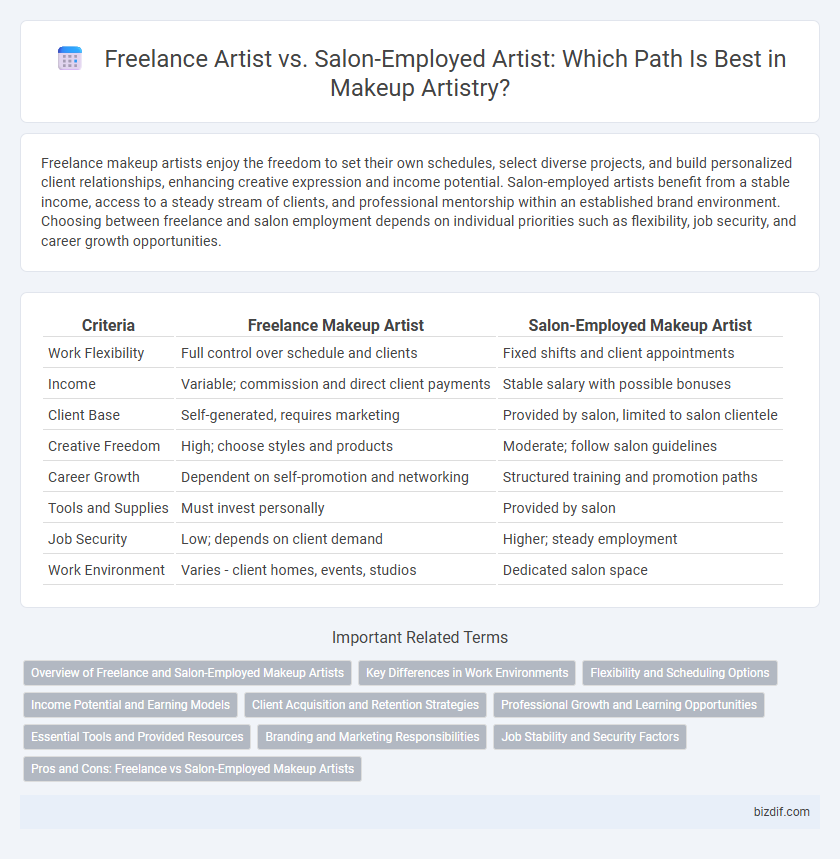Freelance makeup artists enjoy the freedom to set their own schedules, select diverse projects, and build personalized client relationships, enhancing creative expression and income potential. Salon-employed artists benefit from a stable income, access to a steady stream of clients, and professional mentorship within an established brand environment. Choosing between freelance and salon employment depends on individual priorities such as flexibility, job security, and career growth opportunities.
Table of Comparison
| Criteria | Freelance Makeup Artist | Salon-Employed Makeup Artist |
|---|---|---|
| Work Flexibility | Full control over schedule and clients | Fixed shifts and client appointments |
| Income | Variable; commission and direct client payments | Stable salary with possible bonuses |
| Client Base | Self-generated, requires marketing | Provided by salon, limited to salon clientele |
| Creative Freedom | High; choose styles and products | Moderate; follow salon guidelines |
| Career Growth | Dependent on self-promotion and networking | Structured training and promotion paths |
| Tools and Supplies | Must invest personally | Provided by salon |
| Job Security | Low; depends on client demand | Higher; steady employment |
| Work Environment | Varies - client homes, events, studios | Dedicated salon space |
Overview of Freelance and Salon-Employed Makeup Artists
Freelance makeup artists offer personalized services with flexible scheduling and the ability to work across various locations and events, often building a diverse client base through social media and portfolio development. Salon-employed makeup artists typically benefit from a consistent workspace, regular clientele, and access to professional-grade products, but their schedules and service offerings may be more structured. Both paths require strong technical skills, ongoing education in makeup trends, and excellent client communication to succeed in the competitive beauty industry.
Key Differences in Work Environments
Freelance makeup artists enjoy flexible schedules and diverse client interactions, often working in varied locations such as events, photoshoots, and private sessions, requiring strong self-marketing skills and client management. Salon-employed artists benefit from a stable work environment with consistent clientele, access to salon resources, and collaborative networking opportunities, but face fixed hours and less control over client selection. Independent freelancers prioritize adaptability and entrepreneurship, while salon-employed professionals focus on building long-term relationships within an established setting.
Flexibility and Scheduling Options
Freelance makeup artists enjoy greater flexibility in choosing clients and setting their own work hours, allowing for customized scheduling that fits personal commitments. Salon-employed artists typically follow fixed shifts and have less control over their daily timetable, which can limit spontaneous job opportunities. The freedom freelancers have often results in diverse project experiences but requires strong self-management skills to maintain consistent income.
Income Potential and Earning Models
Freelance makeup artists often experience variable income potential influenced by client volume, project types, and market demand, offering opportunities for higher earnings through personalized pricing and diverse gigs like weddings, editorials, and commercials. Salon-employed artists typically earn a fixed hourly wage or commission-based salary, providing steady income but limited scalability compared to freelancing. Understanding commission structures, retail product sales incentives, and client retention strategies is crucial for optimizing overall earnings in both models.
Client Acquisition and Retention Strategies
Freelance makeup artists leverage social media platforms and personalized referral programs to attract and retain clients, building strong one-on-one relationships and showcasing their unique style. Salon-employed artists benefit from the salon's established client base and marketing efforts, relying on walk-ins and brand loyalty for consistent bookings. Both approaches emphasize the importance of client satisfaction and ongoing engagement through follow-up appointments and customized service offerings.
Professional Growth and Learning Opportunities
Freelance makeup artists experience diverse professional growth by working with varied clients and projects, fostering adaptability and creativity. Salon-employed artists benefit from structured training programs, consistent mentorship, and access to industry-standard products and techniques that enhance skill development. Both paths offer unique learning opportunities, with freelancers gaining entrepreneurial skills and salon artists receiving steady education and collaborative experience.
Essential Tools and Provided Resources
Freelance makeup artists must independently invest in essential tools such as high-quality brushes, a diverse palette of foundations, and portable lighting to ensure versatility and client satisfaction. Salon-employed artists benefit from the provided resources, including professional-grade products, sterilization equipment, and dedicated workstations that enhance efficiency and consistency. Access to brand-exclusive items and ongoing product training often distinguishes salon professionals from their freelance counterparts.
Branding and Marketing Responsibilities
Freelance makeup artists manage their own branding and marketing, often leveraging social media platforms, personal websites, and client referrals to build a distinct image and attract diverse clientele. Salon-employed artists benefit from the salon's established brand reputation and marketing resources, reducing the need for self-promotion but limiting individual brand development. Effective branding for freelancers requires consistent visual identity, targeted advertising, and active engagement with audience analytics to optimize client acquisition and retention.
Job Stability and Security Factors
Freelance makeup artists enjoy flexibility and diverse client opportunities but face income variability and lack of employee benefits. Salon-employed artists benefit from steady paychecks, health insurance, and retirement plans, enhancing job security. However, they often have less control over schedules and client selection compared to freelancers.
Pros and Cons: Freelance vs Salon-Employed Makeup Artists
Freelance makeup artists enjoy flexible schedules, creative freedom, and diverse client opportunities but face inconsistent income, self-marketing challenges, and lack of employee benefits. Salon-employed artists benefit from steady pay, access to a built-in clientele, and professional support but often have less creative control, rigid hours, and limited earning potential. Choosing between freelance and salon employment depends on priorities like financial stability versus independence and entrepreneurial growth.
Freelance artist vs Salon-employed artist Infographic

 bizdif.com
bizdif.com